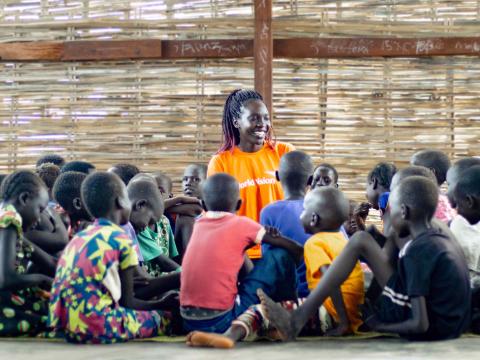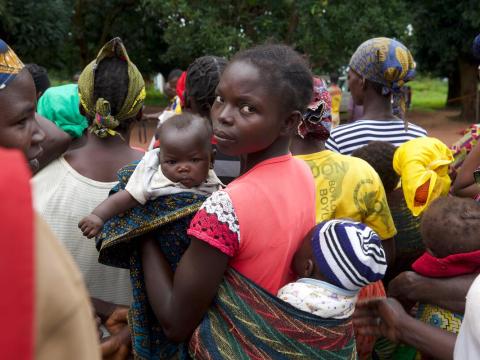
How evidence can drive change for women
Kate Kobaidze writes for International Women's Day on combining the power of data with action, to empower those eager for change, and transform the lives of women and their children.
6 March, 2023
Conducting research is never easy. In truth it can be a huge and psychologically stressful endeavour, because there is no absolute guarantee of its success, neither in terms of findings, nor the impact it can drive.
The pressure is even higher when you are emotionally invested in the topic as was the case for my colleague Juliana Breidy and myself more than a year ago when we launched our “Empowered Women, Empowered Children” research project. We were driven to show/demonstrate why gender equity and a focus on women's empowerment was a non-negotiable for child-focused organisations such as World Vision.
Early on there were indicators that this research was essential.
It was unique. There was a lack of existing evidence connecting mothers' empowerment and the well-being of their children, in both, development and humanitarian settings.
It transcended budgets. Seven World Vision offices in the Middle East and Eastern Europe region committed to unlock these insights and data without having had funding for it into their annual budget.
It set a course for change. The results we saw from the research exceeded our expectations.
In summary, the “Empowered Women, Empowered Children” research demonstrated that a mother's empowerment is a key driver for a child’s well-being. If mothers have decision-making power in their households, are protected from gender-based violence, able to exercise freedom of movement and have good mental health and/or self-esteem, then they are significantly more likely to have children who are well-nourished, educated, and far less exposed to child violence.
The mental well-being of mother and child are directly connected — when mothers feel good, their children also feel good.
So what? Taking action following the results
The research proposed a set of recommendations that answered the question "So what?" which were then further shaped with World Vision partners and peer agencies, such as Action Aid, CARE, and World Food Programme, at an external engagement event soon after the report was published.
The conversation concluded with five commitments, considered critical for advancing gender equity and contributing to SDG 5 in coming years. Below are brief examples of actions that various field offices in World Vision's Middle East and Eastern Europe region have taken over the past year in response to the five commitments .
Commitment 1: Put women's empowerment at the front of our programmes, policies, and funding priorities — not as an add-on or ‘nice to have’.
Action: World Vision Albania used their respective country level “Empowered Women, Empowered Children” evidence to develop a set of recommendations that informed the National Strategy for Development and Integration of Albania, while also engaging with the Ministry of Health and Social protection, and Ministry of Education and Sports on study findings and collaborating on awareness raising campaigns;
Commitment 2: Listen to women’s definition of empowerment and prioritise their physical and psychological well-being across all sectors, especially in livelihoods.
Action: World Vision Armenia utilised their “Empowered Women, Empowered Children” country report to pioneer an in-depth awareness among staff and partner organisations, for training social workers on the importance of gender equality and for organising campaigns against gender-based violence in local communities.
Commitment 3: Consistently engage men in the conversations to better understand and address the barriers to women's empowerment.
Action: World Vision Iraq introduced their “Empowered Women, Empowered Children” report findings to faith leaders from different communities and faith traditions, focusing their attention on domestic and gender-based violence and how it can be prevented through engagement and support from local power-holders.
Action: World Vision Romania, building on the research findings, together with Romanian Police, launched an awareness raising campaign against gender-based violence, which broadcasted all over the country through key media channels.
Commitment 4: Aim to advocate and empower women at the early stage of programme/response planning as both an implementer or provider of funds.
Action: World Vision Albania galvanized a youth movement through introducing their country report findings at the annual youth festival. #1Goal4IMPACT campaign, later designed and led by local youth, explored how gender inequality affects children and youth in everyday life and why social institutions should be concerned with changing harmful gender norms and stereotypes.
Commitment 5: Consider women's empowerment as a proxy indicator - an indirect or mediator indicator - for child well-being, and invest in further research to understand programmatic impact on children in both humanitarian and development contexts.
Action: World Vision Armenia launched several additional research initiatives after publishing their country report exploring the barriers to women’s access social services, gender-responsive policies on displacement and disaster preparedness and status of UN 1325 Resolution on Women, Peace and Security in Armenia.
The “Empowered Women, Empowered Children” findings clearly showed us that women’s empowerment is a key precondition for children to have a fulfilled life, but it also showed us how far we are from desired equality in both in Eastern Europe and Middle East contexts. Even though we sensed and saw inequality daily, only evidence/data such as this can trigger decisive action and the unification of efforts among local communities, partners, civil institutes and informal power-holders, as well as INGOs and donor community.
Gender equality is not only a fundamental human right, but a necessary foundation for a peaceful, prosperous and sustainable world. While there has been progress over the last decades, the world is not on track to achieve gender equality by 2030 (SDG 5). Because of that, having powerful evidence and using it well is a great start, but unless the commitments are continuously championed and acted on by those in a position of power, even the progress that has been achieved with and for women will quickly slip back.
Kate Kobaidze is Strategy and Ministry Quality Director at World Vision's Middle East and Eastern Europe regional office.

